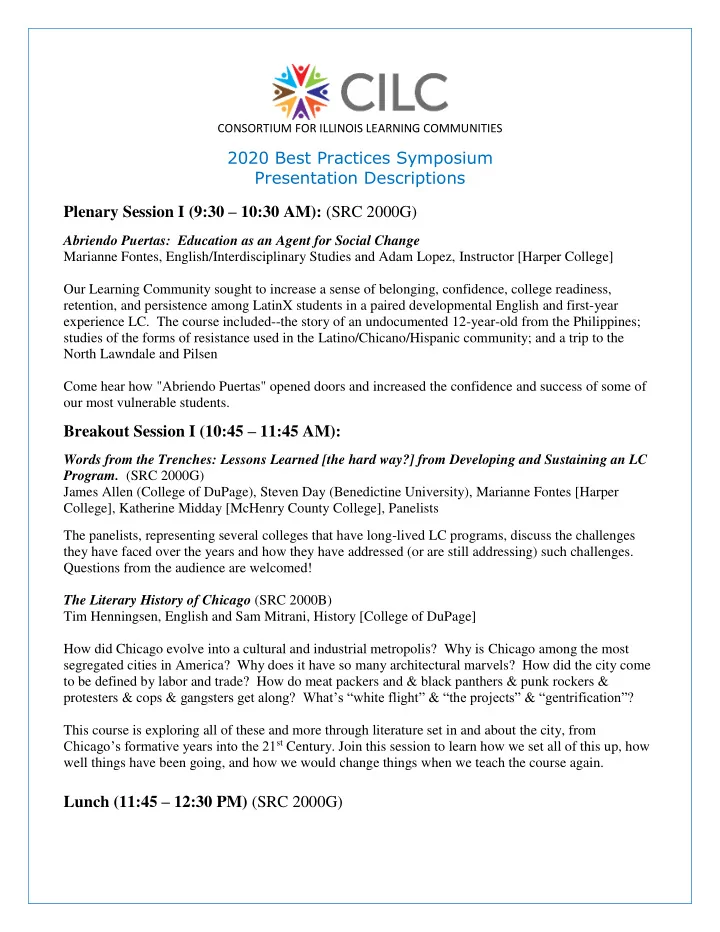

CONSORTIUM FOR ILLINOIS LEARNING COMMUNITIES 2020 Best Practices Symposium Presentation Descriptions Plenary Session I (9:30 – 10:30 AM): (SRC 2000G) Abriendo Puertas: Education as an Agent for Social Change Marianne Fontes, English/Interdisciplinary Studies and Adam Lopez, Instructor [Harper College] Our Learning Community sought to increase a sense of belonging, confidence, college readiness, retention, and persistence among LatinX students in a paired developmental English and first-year experience LC. The course included--the story of an undocumented 12-year-old from the Philippines; studies of the forms of resistance used in the Latino/Chicano/Hispanic community; and a trip to the North Lawndale and Pilsen Come hear how "Abriendo Puertas" opened doors and increased the confidence and success of some of our most vulnerable students. Breakout Session I (10:45 – 11:45 AM): Words from the Trenches: Lessons Learned [the hard way?] from Developing and Sustaining an LC Program. (SRC 2000G) James Allen (College of DuPage), Steven Day (Benedictine University), Marianne Fontes [Harper College], Katherine Midday [McHenry County College], Panelists The panelists, representing several colleges that have long-lived LC programs, discuss the challenges they have faced over the years and how they have addressed (or are still addressing) such challenges. Questions from the audience are welcomed! The Literary History of Chicago (SRC 2000B) Tim Henningsen, English and Sam Mitrani, History [College of DuPage] How did Chicago evolve into a cultural and industrial metropolis? Why is Chicago among the most segregated cities in America? Why does it have so many architectural marvels? How did the city come to be defined by labor and trade? How do meat packers and & black panthers & punk rockers & protesters & cops & gangsters get along? What’s “white flight” & “the projects” & “gentrification”? This course is exploring all of these and more through literature set in and about the city, from Chicago’s formative years into the 21 st Century. Join this session to learn how we set all of this up, how well things have been going, and how we would change things when we teach the course again. Lunch (11:45 – 12:30 PM) (SRC 2000G)
Plenary Session II (12:30 – 1:30 PM) (SRC 2000G) Repurposing Analytical Frameworks to Promote Integrated Student-Centered Learning Through Self-Assessment and Reflective Assignments Chimene Burnett, Writing and Rhetoric; Dr. Scott Pool, Music, Texas A & M University, Corpus Christi This Spring 2020 LC is focused on the idea of "Depth" in music. By the end of the course, students will --be mindful and engaged students through active learning--listening, critical thinking, researching, and analyzing and solving problems; --appreciate and value music, art, and intellectual achievements in society and everyday life; --develop a sense of intellectual agency, self-advocacy, and empowerment through learning and participating in a community; --use music, creativity, quantitative data, and reflection to make discoveries about the self and the world. Students collectively will select music for weekly analysis and evaluation for its "depth" and worthiness of scholarly inquiry. They will also make a group campus-wide presentation at the end of the course. Students will earn bonus points for attending and writing about activities and events on and off campus as well as have made an end-of-course reflection applying the concept of "depth" to their own learning and engagement. In this symposium session, attendees will learn how these great intentions panned out and how things might have gone better. Ideas presented and discussed should encourage those present to take bold steps in designing their own LC courses. Breakout Sessions II (1:45 – 2:45 PM): Integrating a Learning Community with Human Resource Management Content & Employer Relationships to Build HR Careers and Inspire Student Success (SRC 2000A) Jane Murtaugh, Professor of HR Management and Coordinator of HRM Certificate Program [College of DuPage] Learn how integrating a learning community methodology with HRM content and employer relationships has inspired student success and career development. Steps take to create and implement a HRM certificate program and outcomes achieved will also be presented. Presentation will engage and interact with audience through a step-by-step overview of the development of our HRM Certificate Program through our use of an integrated learning community format connecting academics with HR professionals to meet employer needs. From Food Security to Food Justice: Educating for Action at a Community College (SRC 2000B) Deborah Adelman, Professor of English and Shamili Ajgaonkar, Professor of Biology [College of DuPage] All students are participants in a food system, though most often without deliberation, about the social and ecological consequences of their food choices. For over a decade, in our learning community, we have combined environmental biology and film studies to challenge students to understand their individual choices as part of the larger system. Over this time period, the focus of food systems studies has shifted from the notion of food security to that of food justice as key to a sustainable future. In this presentation we will discuss how this understanding in our teaching and student learning has evolved
and how it is connected to the films we select, the assignments we have designed, and the civic engagement and service learning we involve our students in. As a group, we will view a clip from a feature film. We will then break into small groups and analyze a) what food system(s) are represented in the clip b) how the clip offers insight into issues of food security and food justice. Symposium Wrap-up (2:45 – 3:00 PM) (SRC 2000G) Attendees will gather together for some final thoughts and observations on the symposium as a whole.
Recommend
More recommend